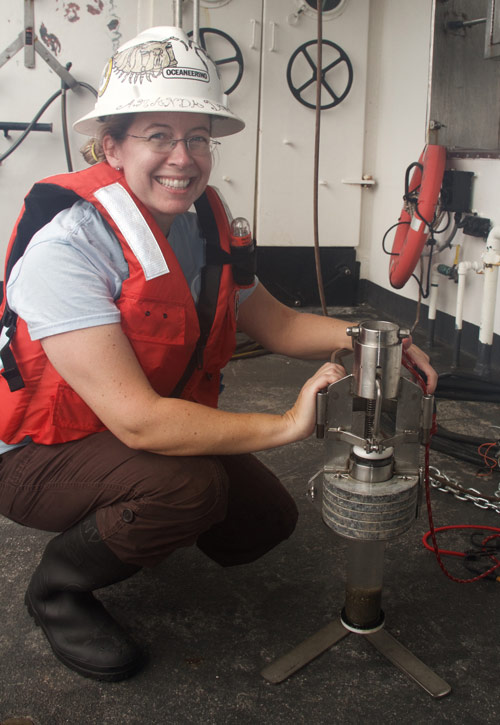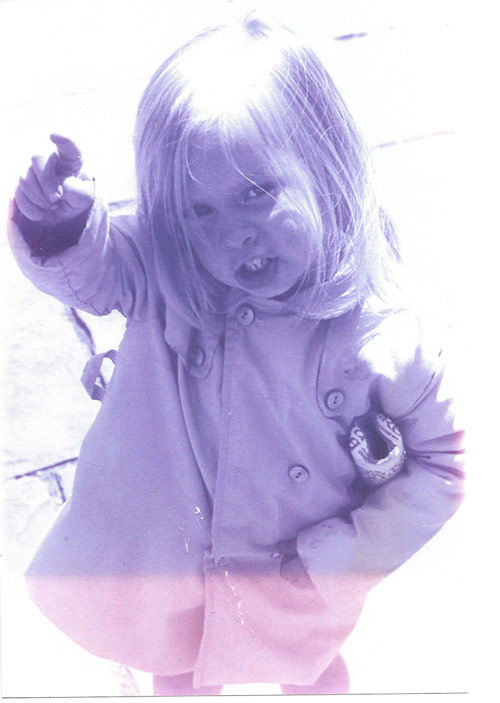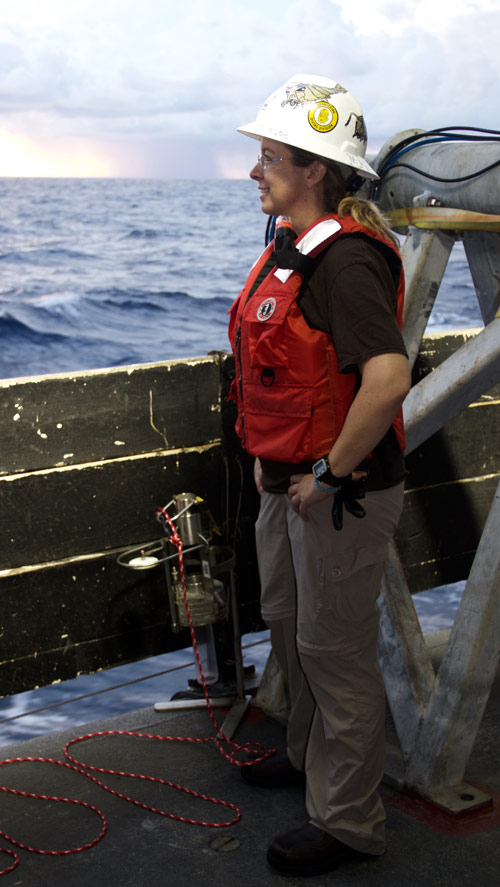
By Liz Baird, Chief of School and Lifelong Education, North Carolina Museum of Natural Sciences
August 27, 2016

Amanda holds a monocore, an instrument used to collect a discrete sample of the bottom sediments. Image courtesy of the Exploring Carolina Canyons expedition. Download larger version (jpg, 4.1 MB).
Have you ever wondered how people become scientists? Have you ever wondered if you could work on a research vessel? Or study the ocean? Or find a new species?
We provide some background information about the science team on the Explorers page. However, we want to give a sense of who they were before they were scientists. Stay tuned to the Mission Logs page as we feature members of the science team throughout the expedition. Next up is Amanda Demopoulos, research benthic ecologist.
Amanda has an old medicine bottle—the kind with a screw cap—that her grandmother gave her. It is filled with tiny shells, and the note from her grandmother that says, “I have found that the small shells look just like the big shells, they just don’t take up as much space.” It was a fitting gift for a child who spent summers with her cousins digging in the sand along the New Jersey shore. Amanda remembers searching in the sand, looking for sand crabs and little clams, oblivious to what was going on around her. What a treat for a child growing up in East Lansing, Michigan, to be able to spend summers at the sea.

When she was two, Amanda’s family traveled to Newcastle England. Here she is holding the rolled up brass-rubbing that they had completed. Image courtesy of the Exploring Carolina Canyons expedition. Download larger version (jpg, 2.8 MB).
Amanda’s parents worked in the medical school—one as a researcher and one as a clinician. As a child, family conversations had over dinner helped nurture her interest in science. She describes the discussions as being intense, complicated, and rich in science. These evenings of asking questions supported her natural inquisitiveness. As the youngest of three children, she was usually asking, “What does that mean?” She learned to be comfortable not knowing all the answers and the value of asking questions.
In her middle school science class, she was introduced to the scientific method, how to run experiments, and to the orderly concept of scientific classification. Her mom let her work in her lab, washing glassware. While it doesn’t sound very scientific, washing glassware in a lab requires specific steps, attention to detail, and following through; all skills that are important in research.
When she was 17, her mom had a year-long sabbatical in Australia. Amanda went to visit, and then spent three weeks traveling on her own. She spent time snorkeling on Fitzroy Island, learning about the environment as she explored. During this pivotal trip, she realized that studying the ocean could be an interesting area of work, and that you could make a career out of it. Traveling alone to visit family and friends meant she had to get out of her comfort zone to explore. She was forced to interact with others and talk to strangers. This trip helped her learn how to be independent and how to talk with and work with a variety of people.
For her undergraduate work, Amanda focused on the trace metals found in tiny planktonic copepods. Those skills she learned washing glassware, such as following a procedure and paying attention to details were very important as she worked with these minute subjects. She says that while it is important to have a balance between social and academic life, she wishes she had studied harder.

Amanda oversees the deployment of a CTD (conductivity, temperature, and depth) rosette over the side of NOAA Ship Pisces. Image courtesy of the Exploring Carolina Canyons expedition. Download larger version (jpg, 3.3 MB).
After receiving her undergraduate degree in Oceanography, Amanda had a fellowship with Dr. Lisa Levin, studying benthic organisms in wetlands. At that point, Amanda wasn’t certain about going to grad school because she had too many interests and not a great deal of focus. Studying with Dr. Levin propelled her into graduate studies, first studying food selection by deep-sea organisms and later studying invasive mangroves in Hawaii.
Reflecting on what contributed to her interest and skills in science, Amanda quickly pointed out that there are many ways to gain the abilities you need. While summer camps in electronics and computer programming taught her “how things work,” equally valuable were the experiences that required collaboration, communication, and study. Opportunities to travel, be it to a local museum, or outside to a park, let her go, “beyond the Internet and to having hands-on experiences.” She is grateful that her parents never said, “no, you can’t do that,” but instead encouraged her to adventure into new areas.
Amanda’s grandmother must have known her well, as Amanda continues to find those tiny organisms living in the bottom of the sea.